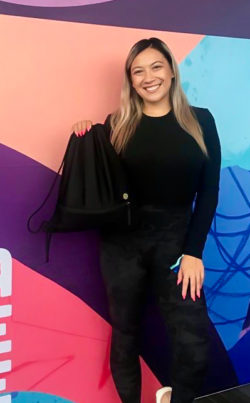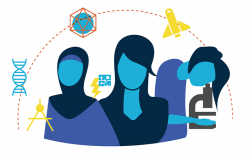Get to know Krysten Carlson – Chemist, Lab Manager, and Notable Woman in STEM
Krysten works behind the scenes with six different clinics across Washington state, where she uses her STEM skills, expertise, and knowledge to ensure patients can receive the medical help that’s tailored to their situation. Born and raised in Guam, Krysten received her bachelor’s degree in Chemistry from the University of Washington before beginning her career.
What was your education and/or career path? How did you get where you are now?

When I was growing up on Guam, I saw a lot of health problems in my community. On our island, we always helped and took care of the people around us. I saw a lot of people who were sick and needed that support, and I wanted to be the one to help them.
My interest in STEM really started with my high school chemistry class. I was always a strong student, until high school chemistry in my junior year. That was the first time I was really challenged academically. Given that challenge, it meant more to me to do well in a subject that I had to work really hard at. After realizing that chemistry was a challenge, but something I enjoyed, I took AP chemistry my senior year. That was another year of working really hard, but I did well!
After finishing up high school, I applied to the University of Washington to study general chemistry. I packed up my bags, left Guam, and began my studies in Seattle. If high school chemistry was a challenge, chemistry in college was even tougher. But I had made up my mind, and I knew that this was the path I was going to follow, so I pushed myself even further. I was lucky to find a job right after I graduated, where I worked in an environmental chemistry lab for four years. From there, I worked at a few different labs focusing on pain management, which led me to where I’m at now. I’ve been working in clinical labs focused on pain management for about six years now.
What/who were some of the most important influences that guided you to STEM?
I was really pushed and encouraged in High School but after that, there wasn’t anyone I knew or was close to that I could go to. I was the first one in my family and among my friends to take this path. My parents were in finance, and my friends were all focusing on subjects that had nothing to do with chemistry. I was a bit of a lone wolf in my journey. I received encouragement from them, but I had to figure out a lot of stuff on my own. I went to Samuel E. Kelly Ethnic Cultural Center a lot to study, but in my personal life, I was the only one pursuing STEM. However, I was committed. I knew I could complete my college education and be a STEM professional. After I landed my first job, I had a much deeper appreciation of all of the challenges I had conquered during college.

What is your favorite part of your STEM career?
For me, I really love being able to be a part of the solution to the opioid crisis that has affected so many people in our country and in Washington. As a chemist and lab manager, I get to consult with doctors who are looking for my expertise in how they can best treat their patients. That means a lot to me. It means that because of my hard work, I get to help people find the best path forward when grappling with pain management. When I first began my job, Washington was at the height of the opioid crisis. When it comes to the nitty-gritty of chemistry, one of my favorite things about my job is the process of learning a result. So much of my job requires being really specific in all things that you do, and so it almost feels like a recipe. I consider myself process-oriented, and my career really scratches that itch for me.
What do you consider your most significant achievement in STEM?
There are a few things that stand out to me, but one of the biggest achievements is gaining the trust of the doctors I work with. I haven’t been in my industry long, compared to some of my peers, but when doctors call me and say, “I’d like your expertise on this,” it means a lot to me. I’ve worked hard to get where I’m at, and it’s very affirming to have medical professionals ask for my professional opinion on issues that could have a major impact on a patient’s life. Another part of my job that I love is related to making sure that I’m always performing at a high level. The state of Washington regulates our lab, and with that regulation comes testing and accountability. That means that I have to be on top of my game all the time. I find it very satisfying to maintain such high standards for myself and for my lab.
Are there any stereotypes in STEM you’d like to personally dispel?
When I began college, and even now, when I meet new people, I’m often asked, “What do you do?” When I tell them that I’m a chemist and a lab manager, I often get the response, “You must be so smart!” And yes, the coursework was rigorous and challenging, but if you want something and you try hard, you don’t have to have to be a genius to pursue and succeed in STEM. Just like anything in life, if you really want something, you have to work for it, and over time you will build up the knowledge and skills you need to succeed. Any girl or woman who wants to pursue STEM already has what it takes, you’ve just got to work hard at it.
What unique qualities do you think girls and women bring to STEM?
I think women are just so efficient at whatever they do. When you put a woman in to a workflow, she’ll come out of that work with really good ideas about how to do things quicker and more efficiently, without sacrificing quality. Women are also really, really great critical thinkers and up for any challenge. The women that I know and work with really embody these qualities.
What would you like to say to young women thinking about beginning a career in STEM?
Mentorship is so critical to any young, aspiring STEM professional, especially for young women. It’s always exciting going into a new field of study, and the ideas that you have around creating change and making an impact are important. But it’s also important to know that there have been women and STEM professionals who have come before you, and those people have a lot to teach and share with you! Those lessons you learn through having a mentor can help create the foundation for your own learning and career plans. Find a mentor and soak up as much knowledge as you can! And to every young girl who’s thinking about pursuing STEM, I’m so proud and glad you’re up for the challenge. When you sign up for STEM, you sign up to be a lifelong learner!
How do you see science, technology, engineering, and/or math working together in your current job?
As a chemistry and lab manager, I see all STEM subjects show up in my daily at work. Whether that’s through the equipment and technology I use every day, or the measurement and math that I need to understand lab results, or the STEM professionals that I need to communicate with to do my job. And of course, at the core of what I do is science. I use science to not only understand the world around me but also to improve the health and lives of patients across Washington.